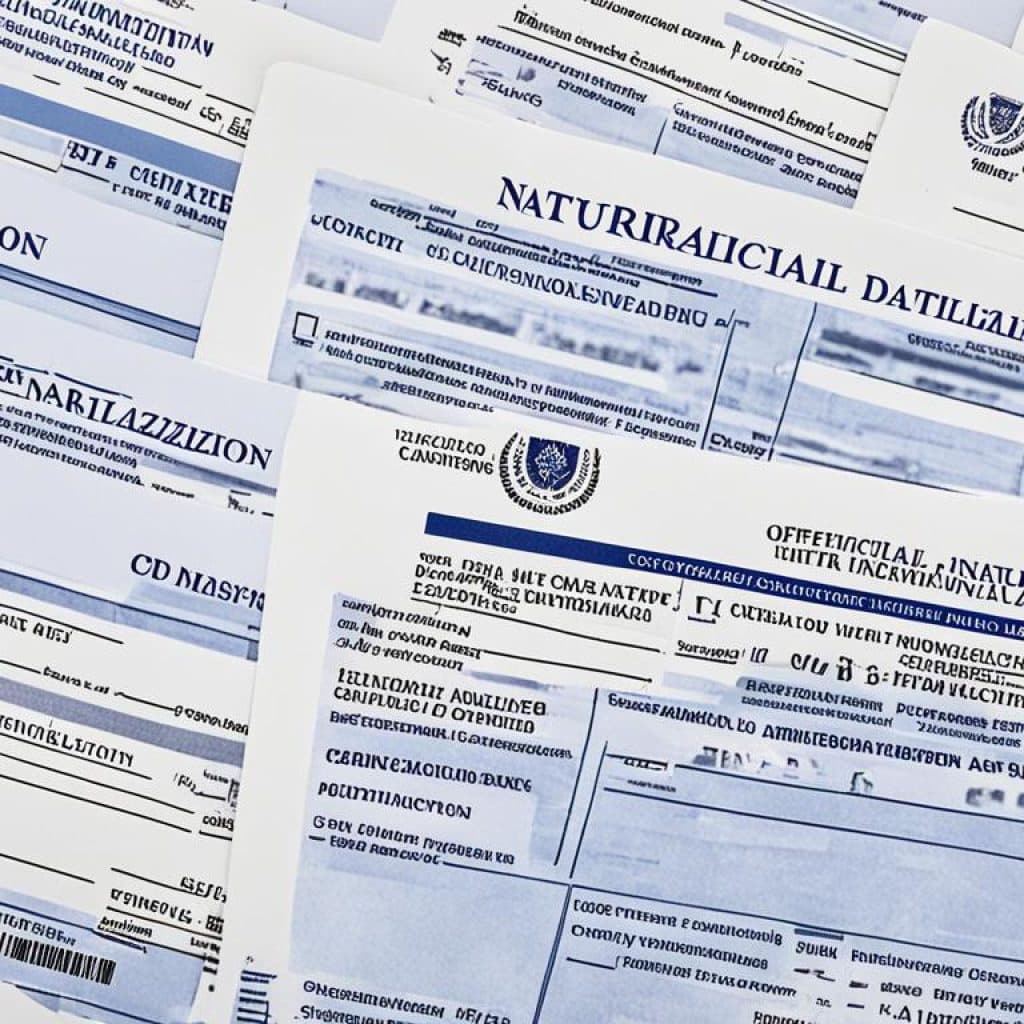Have you ever wondered how to become a US resident? Are you curious about the US residency requirements and the process to obtain a green card? Look no further, as this guide will walk you through the immigration process, including the naturalization process, permanent residency, and US citizenship requirements. Whether you’re considering immigrating to the US or already in the country and want to secure your future, this article will provide you with the essential information you need.
Immigration to the US can be a complex and daunting journey, but understanding the steps and guidelines can make the process much easier. From the visa process for US residency to the naturalization process, each stage has its own set of requirements and procedures. So, are you ready to embark on this life-changing path towards becoming a US resident? Let’s dive in and explore how to navigate the US immigration laws and achieve your dream of permanent residency in the US.
Key Takeaways:
- Understanding the US residency requirements is crucial for anyone considering immigration to the US.
- The naturalization process is the pathway to US citizenship for eligible individuals.
- Obtaining a green card is a vital step towards permanent residency in the US.
- US immigration laws outline the guidelines and regulations for individuals seeking to become US residents.
- From the visa process for US residency to the naturalization process, each step has specific requirements and procedures.
Determine if you are already a U.S. citizen
Before applying for naturalization, it’s important to ascertain your current citizenship status. There are two primary ways you may already be a U.S. citizen: through birth or by acquiring citizenship through your parents.
If you were born in the United States, you are automatically a U.S. citizen by birth. This means you don’t need to go through the naturalization process. Congratulations!
If you were born outside the U.S. but have at least one parent who is a U.S. citizen, you may be eligible to acquire U.S. citizenship through your parents. The specific requirements and process for acquiring citizenship vary depending on the circumstances and applicable laws.
Note: The process of acquiring U.S. citizenship through parents can be complex. It’s recommended to consult with an immigration attorney or refer to official government resources for guidance and specific eligibility criteria.
If you are not a U.S. citizen by birth or through your parents, you will need to proceed with the naturalization process to acquire U.S. citizenship.
Next, let’s determine if you meet the eligibility requirements to become a U.S. citizen through naturalization.
Determine if you are eligible to become a U.S. citizen
Before proceeding with your naturalization application, it is crucial to determine if you meet the eligibility requirements for US citizenship. The United States Citizenship and Immigration Services (USCIS) provides a naturalization eligibility worksheet that can help you assess your qualifications. By reviewing this worksheet, you can determine if you fulfill the necessary criteria to apply for US citizenship.
The naturalization eligibility requirements encompass various factors, including:
- Your length of time as a permanent resident
- Your physical presence in the United States
- Your ability to demonstrate good moral character
- Your familiarity with the English language and US government
- Your willingness to support the principles of the US Constitution
By assessing these factors, you can determine if you are eligible to proceed with the naturalization process and pursue your dream of becoming a US citizen. It is important to carefully review all the requirements and ensure that you fulfill them before submitting your application.
If you find that you meet the naturalization eligibility requirements, congratulations! You are one step closer to achieving US citizenship. However, if you discover that you do not currently meet the necessary criteria, it may be helpful to consult an immigration attorney or an accredited immigration expert who can provide guidance on how to improve your eligibility.
Quote: “The naturalization eligibility worksheet provided by USCIS is a valuable resource for determining if you meet the requirements to apply for US citizenship.” – USCIS spokesperson
Prepare your Form N-400, Application for Naturalization
Once you determine your eligibility, it’s time to prepare your Form N-400, the Application for Naturalization. This form is one of the most important aspects of your naturalization process, so it’s crucial to complete it accurately and thoroughly. Here’s a step-by-step guide to help you navigate the preparation process:
- Read the instructions: Begin by carefully reading the instructions provided by the United States Citizenship and Immigration Services (USCIS) for completing Form N-400. Familiarize yourself with the requirements and guidelines to ensure you provide all the necessary information.
- Gather your documents: Collect all the required documents to demonstrate your eligibility for naturalization. These documents may include your green card, passport, tax returns, and evidence of your continuous residency in the United States. Refer to the document checklist provided by USCIS to ensure you have all the necessary paperwork.
Remember to complete Form N-400 truthfully and accurately. Providing false information or withholding relevant details can have serious consequences, including your application being denied or deportation.
By thoroughly preparing your Form N-400 and providing all the required documents, you increase your chances of a smooth and successful naturalization application.

Required Documents for Naturalization
| Document | Description |
|---|---|
| Green Card | Proof of your permanent residency in the United States |
| Passport | Valid identification document |
| Tax Returns | Evidence of your compliance with tax obligations |
| Residence Evidence | Documents proving your continuous residency in the United States |
| Selective Service Registration | For male applicants aged 18-25 |
These are just a few examples of the documents you may need to provide. Refer to the document checklist provided by USCIS for a complete list based on your individual circumstances.
Submit your Form N-400 and pay your fees
Once you have completed your Form N-400, it’s time to submit it and pay the necessary fees to USCIS. This is an essential step in the naturalization process. By doing so, you are officially requesting consideration for US citizenship.
Submitting your Form N-400 can be done conveniently online, saving you time and effort. Simply follow the instructions provided by USCIS to ensure accurate and complete submission.
In addition to submitting your application, you will also need to pay the required naturalization fees. These fees cover the cost of processing your application and conducting necessary background checks.
The exact amount of the naturalization fees may vary, so it’s important to check the most up-to-date information on USCIS’s official website. As of (mention current year), the filing fee for Form N-400 is $725.
It’s important to note that USCIS fees are subject to change, so it’s advisable to verify the current fees before submitting your Form N-400.
Once you have submitted your form and paid the fees, USCIS will send you a receipt notice to confirm the receipt of your application. This notice serves as proof that your application is in process and will include important information such as your receipt number.
Make sure to keep this receipt notice in a safe place, as it will be required for future reference and tracking the status of your application.
You can also check the case processing times and status of your application online using the receipt number provided in the notice. This allows you to stay informed about the progress of your application throughout the naturalization process.
Naturalization Fees
| Naturalization Form | Filing Fee | Biometric Services Fee | Total Fee |
|---|---|---|---|
| Form N-400 | $640 | $85 | $725 |
Go to your biometrics appointment, if applicable
If you are required to provide biometrics as part of your naturalization process, you will receive an appointment notice from the United States Citizenship and Immigration Services (USCIS). This notice will contain the date, time, and location of your biometrics appointment. It is crucial to arrive on time and ensure that you have all the necessary documents with you.
Biometrics are a vital part of the naturalization process as they help establish your identity and ensure the accuracy and integrity of your application. During your biometrics appointment, USCIS will capture your fingerprints, photograph, and signature, which will be used for background checks and verification purposes.
Attending your biometrics appointment is crucial for the smooth processing of your naturalization application. Failure to attend your appointment may result in delays or potential denial of your application. Make sure to follow the instructions provided in the appointment notice and bring any required documents, such as your valid identification and appointment notice.
Once your biometrics are collected, USCIS will continue processing your naturalization application, taking the necessary steps to review your eligibility and determine your suitability for US citizenship.
Remember, your biometrics appointment is an important milestone on your path to becoming a US citizen. Stay prepared and organized, and if you have any questions or concerns, don’t hesitate to reach out to USCIS for assistance.
Complete the interview
Once the preliminary processes, such as submitting your Form N-400 and attending the biometrics appointment, are complete, the next step in the naturalization process is the interview with the United States Citizenship and Immigration Services (USCIS). This interview is a crucial part of the process and provides an opportunity for USCIS to assess your eligibility for US citizenship.
During the interview, an immigration officer will review your application, ask you questions about your background, and evaluate your knowledge of English and civics. It is essential to report to the USCIS office on the specified date and time, as failure to do so may result in delays or even denial of your application.
To ensure a successful interview, it is important to be prepared. Review your application and the required documents beforehand to refresh your memory and ensure accuracy. Bring all the original documents and copies requested by USCIS, such as your passport, green card, and any additional supporting evidence.
The officer may also ask questions about your moral character and conduct, so it is crucial to be honest and provide truthful answers. If you have any concerns or questions about the interview process, do not hesitate to seek assistance from an immigration attorney or qualified representative.
Remember, the interview is not a test to trick you, but rather an opportunity for USCIS to verify the information provided in your application and determine your eligibility for US citizenship. Stay calm and confident, and be respectful throughout the interview.
| Interview Tips | |
|---|---|
| 1. Be punctual and arrive on time for your scheduled interview. | |
| 2. Dress appropriately and present yourself professionally. | |
| 3. Practice answering potential interview questions in English. | |
| 4. Familiarize yourself with the US civics test and study the possible questions. | |
| 5. Bring all the required documents and copies as requested by USCIS. | |
| 6. Be honest and provide accurate information during the interview. | |
| 7. Maintain a positive attitude and show respect to the immigration officer. | |
| 8. Seek legal advice if you have any concerns or questions about the interview process. |
Remember, the interview is an important step in the naturalization process, and a successful interview brings you one step closer to achieving your dream of becoming a US citizen. Stay prepared, confident, and truthful, and you’ll be well on your way to obtaining US citizenship.

Receive a decision from USCIS on your Form N-400
After completing your interview, you eagerly await the decision from the U.S. Citizenship and Immigration Services (USCIS) regarding your Form N-400 application for naturalization. This decision is a crucial step in the process, determining whether your application will be approved, require additional documents, or be denied.
USCIS will notify you of their decision by mail, and itâs important to closely review the notice to understand the outcome of your application. Let’s explore the possible scenarios:
-
Approval of Form N-400:
If your application is approved, congratulations! This means that USCIS has determined that you meet all the requirements for naturalization, and you are one step closer to becoming a U.S. citizen. Keep the approval notice in a safe place as it may be needed for future reference.
-
Request for Additional Documents:
In some cases, USCIS may request additional documents or evidence to support your eligibility for naturalization. If you receive this request, it is essential to provide the requested documents promptly and accurately. Follow the instructions provided in the notice and submit the required information within the given timeframe.
-
Denial of Naturalization Application:
It is disheartening, but sometimes USCIS may deny an application for naturalization. This decision can occur due to various reasons such as insufficient evidence, failure to meet certain requirements, or issues related to the applicant’s background. If your application is denied, the notice will explain the reasons for the denial. It’s important to review the information carefully and understand the basis for the decision.
“Your USCIS decision letter holds crucial information about the outcome of your naturalization application. Take the time to read it thoroughly, understand the decision, and be prepared to take appropriate action based on the outcome.”
If your application is denied, don’t lose hope. You may have the option to appeal the decision or reapply in the future, depending on the circumstances. It’s advisable to consult an immigration attorney or seek legal advice to explore your options and determine the best course of action.
Remember, receiving a decision from USCIS on your Form N-400 is an important milestone in your journey towards becoming a U.S. citizen. Stay positive and proactively respond to USCIS requests to ensure the smoothest possible path to naturalization.
Receive a notice to take the Oath of Allegiance
Once your Form N-400 is approved, you are one step closer to becoming a United States citizen. If you are fortunate, you may have the opportunity to participate in a naturalization ceremony on the same day as your interview, making the entire process more seamless and efficient.
However, if you are not able to attend the naturalization ceremony immediately after your interview, don’t worry. USCIS will send you a notification with the date, time, and location of your scheduled ceremony. This notice will provide all the essential information you need to be prepared for this momentous occasion.
The naturalization ceremony, also known as the Oath of Allegiance ceremony, is a significant event where you, along with other individuals who have successfully completed the naturalization process, take an oath pledging your loyalty and commitment to the United States. It is a symbolic step that marks your official transition from a permanent resident to a United States citizen.
During the naturalization ceremony, you will be surrounded by your fellow candidates, family, and friends, creating a sense of community and celebration. The ceremony typically includes speeches, the recitation of the Oath of Allegiance, and the distribution of Certificates of Naturalization, officially recognizing you as a US citizen.
Naturalization Ceremony Process
Below is an overview of the typical process that takes place during a naturalization ceremony:
- Gather at the designated location: Arrive at the designated location mentioned in your notice with sufficient time to complete any necessary paperwork or check-in procedures.
- Welcome and introduction: USCIS officials will welcome you and provide an introduction to the ceremony.
- Oath of Allegiance: You and the other candidates will take the Oath of Allegiance together, led by an official from USCIS.
- National anthem and pledge: The national anthem will be sung, followed by the recitation of the Pledge of Allegiance.
- Distribution of Certificates of Naturalization: USCIS officials will distribute Certificates of Naturalization to each candidate. This document is your official proof of US citizenship.
- Closing remarks: The ceremony concludes with closing remarks, offering congratulations to the new citizens and emphasizing the rights and responsibilities that come with US citizenship.
Attending the naturalization ceremony is a moment of great significance and pride. It highlights your commitment to your new country and serves as a reminder of the rights, opportunities, and responsibilities that come with being a United States citizen.
Rights and Responsibilities of U.S. citizens
| Rights | Responsibilities |
|---|---|
| Freedom of speech, religion, and expression | Obeying federal, state, and local laws |
| Right to vote and participate in the democratic process | Serving on a jury when called upon |
| Right to work and seek employment opportunities | Defending the United States if called upon for military service |
| Access to various government benefits and programs | Respecting the rights and beliefs of others |
By taking the Oath of Allegiance and participating in the naturalization ceremony, you officially become a United States citizen, gaining all the rights and responsibilities that come with it. It opens up a world of possibilities and opportunities, allowing you to fully embrace your new American identity.
Take the Oath of Allegiance to the United States
To become a US citizen, you must take the Oath of Allegiance at a naturalization ceremony. This solemn ceremony marks the final step on your journey to becoming a proud citizen of the United States.
Before the ceremony, you will need to complete the questionnaire on Form N-445, which will be provided to you. This form ensures that all necessary information is obtained and recorded accurately.
On the day of your naturalization ceremony, report to the designated location at the scheduled time. Be sure to bring your Green Card with you, as it will be collected during the ceremony.
The highlight of the ceremony is when you stand together with other new citizens, raise your right hand, and recite the Oath of Allegiance. This powerful moment symbolizes your commitment to uphold the values and principles of the United States.
“I hereby declare, on oath, that I absolutely and entirely renounce and abjure all allegiance and fidelity to any foreign prince, potentate, state, or sovereignty of whom or which I have heretofore been a subject or citizen.”
“I will support and defend the Constitution and laws of the United States of America against all enemies, foreign and domestic.”
“I will bear true faith and allegiance to the same.”
“I will bear arms on behalf of the United States when required by the law.”
“I will perform noncombatant service in the Armed Forces of the United States when required by the law.”
“I will perform work of national importance under civilian direction when required by the law.”
“I take this obligation freely, without any mental reservation or purpose of evasion; so help me God.”
After saying the Oath of Allegiance, you will receive your Certificate of Naturalization, which officially recognizes you as a US citizen. This momentous document is a testament to your dedication and hard work.
By taking the Oath of Allegiance, you not only gain the rights and privileges that come with US citizenship but also the responsibility to contribute to the continued growth and success of this great nation.
What is naturalization?
Naturalization refers to the process by which an immigrant becomes a US citizen. It is an important step for individuals who are not US citizens by birth or did not acquire US citizenship through their parents. Through naturalization, eligible immigrants, such as green card holders and those meeting specific military service requirements, can obtain US citizenship.
During the naturalization process, immigrants must meet certain criteria set by the US government to prove their eligibility for citizenship. This includes demonstrating a sufficient period of permanent residency, fulfilling physical presence requirements, and adhering to specific guidelines for military service members.
Naturalization is a significant milestone that grants immigrants the same rights and responsibilities as US-born citizens. It provides opportunities for individuals to fully participate in American society, exercise their voting rights, and contribute to the nation’s diverse fabric.
For a visual representation of the naturalization process, refer to the table below:
- Determine eligibility for naturalization
- Prepare and submit Form N-400, Application for Naturalization
- Complete biometrics appointment (if applicable)
- Attend the naturalization interview
- Receive a decision from USCIS on Form N-400
- Receive a notice to take the Oath of Allegiance
- Take the Oath of Allegiance
As immigrants embark on their naturalization journey, understanding the process and meeting the eligibility requirements will help streamline the path to US citizenship.
What is citizenship?
Citizenship is the status granted to someone either by birth or through the naturalization process. It is a legal recognition of an individual’s membership in a particular country, entitling them to certain rights and responsibilities.
US citizenship is a significant milestone that comes with a wide range of benefits and duties. As a US citizen, you have the right to live, work, and study in the United States without any immigration restrictions. You can also apply for a US passport, which enables you to travel internationally with the support and protection of the US government.
Being a US citizen also means you have the power to participate fully in the democratic process. You can exercise your right to vote and have a say in the election of public officials and the decision-making processes that shape the nation. Furthermore, US citizens have the opportunity to serve on a jury and contribute to the administration of justice in their communities.
âCitizenship is a precious bond, and it should be cherished and protected. Citizens have the right to participate in the processes of democracy, to have their voices heard, and to be treated fairly.â – Barack Obama
However, alongside these rights, US citizenship also brings responsibilities. As a US citizen, it is your duty to obey the laws of the country and contribute to its welfare by paying taxes. Additionally, citizens are encouraged to actively engage in their communities, support charitable organizations, and promote the general welfare of society.
The acquisition of US citizenship is a significant accomplishment that symbolizes the fulfillment of the American Dream and the embracing of a shared national identity. By becoming a US citizen, you gain not only legal status but also a deeper connection to the values and principles that define the United States.
Rights of US citizens:
- Right to live, work, and study in the United States without immigration restrictions
- Right to apply for a US passport and travel internationally with US government support
- Right to vote in elections and participate in the democratic process
- Right to serve on a jury and contribute to the administration of justice
Responsibilities of US citizens:
- Obeying the laws of the United States
- Contributing to the welfare of the nation by paying taxes
- Actively engaging in the community and supporting charitable organizations
Naturalization timeline
The naturalization process, from filing the application to attending the Oath of Allegiance ceremony, typically takes about 10 months. However, it’s essential to note that the timeline may vary based on individual circumstances and factors such as USCIS processing times and the complexity of your case.
Here is a general breakdown of the naturalization process timeline:
- Step 1: File Form N-400
- Step 2: USCIS Biometrics Appointment
- Step 3: USCIS Interview
- Step 4: Decision and Oath of Allegiance
Once you have determined your eligibility for naturalization and gathered all the necessary documents, you can file Form N-400, Application for Naturalization. This step marks the official start of your naturalization journey.
After submitting your Form N-400, USCIS will schedule an appointment for biometrics, where they will collect your fingerprints, photograph, and signature.
Upon completing the biometrics process, you will be scheduled for an interview with a USCIS officer. During the interview, the officer will review your application, ask you questions about your background and your eligibility for naturalization.
After the interview, USCIS will make a decision regarding your naturalization application. If approved, you will receive a notice to attend the Oath of Allegiance ceremony, where you will take the final step towards becoming a US citizen.
Example of Naturalization Timeline
| Step | Timeline |
|---|---|
| File Form N-400 | 2-4 weeks |
| USCIS Biometrics Appointment | 4-8 weeks |
| USCIS Interview | 3-6 months |
| Decision and Oath of Allegiance | 2-4 weeks |
Please note that this is just a hypothetical example, and actual timelines can differ. It’s crucial to consult official USCIS resources and stay in touch with your assigned USCIS officer for the most accurate and up-to-date information.
“The journey to US citizenship requires patience and adherence to the naturalization process. By understanding the general timeline and diligently completing each step, you can achieve your goal of becoming a US citizen.”
Naturalization cost
Applying for naturalization comes with certain fees that individuals need to be aware of. The cost of naturalization includes government fees for processing the application and conducting biometrics. As of the latest update, the filing fee for naturalization applications is $725.
This fee includes both the processing fee and the biometrics fee. The processing fee covers the administrative costs associated with reviewing and adjudicating the application, while the biometrics fee covers the cost of collecting fingerprints, photographs, and signatures.
It is important to note that certain individuals may be exempt from the biometrics fee. Military applicants who meet specific criteria, as well as individuals aged 75 and older, are not required to pay the biometrics fee.
Here is a breakdown of the naturalization cost:
| Fee | Amount |
|---|---|
| Processing Fee | $640 |
| Biometrics Fee | $85 |
It is important to consider the naturalization cost when planning your path to US citizenship. Ensure that you have the necessary funds to cover the fees associated with the naturalization process. Remember that these fees are subject to change, so it is always a good idea to double-check the current fees on the official USCIS website before submitting your application.

By understanding the cost of naturalization and preparing accordingly, you can take the necessary steps towards becoming a US citizen.
Eligibility for naturalization
Eligibility for naturalization is determined by several key factors, including the length of time you have held a green card, your physical presence in the United States, and whether you have served in the military. Meeting these requirements is essential for becoming a U.S. citizen. Additionally, specific eligibility criteria exist for different groups, such as spouses of U.S. citizens and military service members.
Green Card Holders
As a green card holder, also known as a lawful permanent resident, you may be eligible to apply for naturalization after maintaining your status for a certain period of time. Generally, you must have held your green card for at least five years as a permanent resident to qualify for naturalization. However, if you obtained your green card through marriage to a U.S. citizen, this requirement may be reduced to three years.
Physical Presence
Another crucial requirement for naturalization is meeting the physical presence requirement. This means demonstrating that you have been physically present in the United States for a specified amount of time during the period you held your green card. Generally, you must have been physically present in the U.S. for at least half of the time required to fulfill the residency requirement (three out of five years for most green card holders, or one and a half out of three years for spouses of U.S. citizens).
Military Service
Military service members and certain veterans may be eligible for expedited naturalization. The specific requirements and benefits vary based on the branch of the military and length of service. Serving in the U.S. Armed Forces demonstrates a commitment to the country and can provide an expedited path to citizenship.
| Eligibility Criteria | Green Card Holders | Spouses of U.S. Citizens | Military Service Members |
|---|---|---|---|
| Length of Time as a Permanent Resident | Generally 5 years | 3 years | Varies by branch and length of service |
| Physical Presence in the U.S. | At least half of the required residency period | At least half of the required residency period | Varies by branch and length of service |
| Military Service Requirement | N/A | N/A | Varies by branch and length of service |
Meeting the eligibility requirements is the first step towards naturalization, and understanding how these requirements apply to your specific situation is crucial. If you meet the criteria, you can move on to the next steps in the naturalization process and work towards becoming a U.S. citizen.
Conclusion
Becoming a US resident through the naturalization process is a significant step towards securing your future in America. By following the steps outlined in this guide, you can navigate the process with ease.
First, determine if you are already a US citizen by birth or if you acquired US citizenship through your parents. If not, review the naturalization eligibility requirements to ensure you are eligible to apply for naturalization.
Next, prepare your Form N-400, the application for naturalization, and gather all the necessary documents. Submit your application online and pay the required fees. Attend your biometrics appointment, if applicable, and complete the interview with USCIS.
Finally, await a decision from USCIS on your Form N-400. If approved, you will receive a notice to take the Oath of Allegiance and participate in a naturalization ceremony. Take the Oath and receive your Certificate of Naturalization, marking your official status as a US citizen.
By following these steps and fulfilling the requirements, you can successfully become a US resident and gain all the rights and responsibilities that come with US citizenship. Best of luck on your journey to becoming a proud US citizen!
FAQ
How can I determine if I am already a U.S. citizen?
You can determine if you are already a U.S. citizen by birth or if you acquired U.S. citizenship through your parents. If not, you can proceed with the naturalization process.
How can I determine if I am eligible to become a U.S. citizen?
You can review the naturalization eligibility requirements provided by USCIS, such as the length of time as a permanent resident and physical presence in the U.S., to determine if you meet the criteria for naturalization.
How do I prepare my Form N-400, Application for Naturalization?
To prepare your Form N-400, you should read the instructions carefully and collect all necessary documents to demonstrate your eligibility for naturalization. USCIS provides a document checklist to help you through the process.
How do I submit my Form N-400 and pay the required fees?
You can submit your Form N-400 online and pay the required fees. USCIS will send you a receipt notice once your application is received. You can also check your case processing times and status online.
Do I need to go to a biometrics appointment for naturalization?
If required, USCIS will send you an appointment notice for biometrics collection. It is important to arrive on time and have your biometrics taken as scheduled.
What should I expect during the naturalization interview?
During the naturalization interview, you will be interviewed by a USCIS officer. Make sure to report to the USCIS office on the specified date and time and bring all the required documents.
What happens after the naturalization interview?
USCIS will mail a notice of decision to you after the interview. The decision can be an approval, a request for additional documents, or a denial based on the evidence provided.
What is the process for taking the Oath of Allegiance?
If your Form N-400 is approved, you may be able to participate in a naturalization ceremony on the same day as your interview. Otherwise, USCIS will send you a notification with the date, time, and location of your scheduled ceremony.
What is naturalization?
Naturalization is the process through which an immigrant becomes a U.S. citizen. Only certain immigrants, such as green card holders, are eligible to apply for naturalization.
What is citizenship?
Citizenship is the status granted to someone either by birth or through the naturalization process. It comes with various rights and responsibilities, including the ability to vote and serve on a jury.
How long does the naturalization process take?
The naturalization process, from filing the application to attending the Oath of Allegiance ceremony, currently takes about 10 months. However, the timeline may vary based on individual circumstances.
How much does naturalization cost?
The current filing fee for naturalization applications is $725, which includes processing and biometrics fees. Certain military applicants and those aged 75 and older may be exempt from the biometrics fee.
What are the eligibility requirements for naturalization?
Eligibility for naturalization depends on factors such as the length of time as a green card holder, physical presence in the U.S., and military service. There are specific requirements for different groups, such as spouses of U.S. citizens and military service members.
How can I become a U.S. resident through naturalization?
By following the steps outlined in this guide, you can navigate the naturalization process and work towards becoming a U.S. citizen. Fulfill the requirements, submit your application, and attend the necessary appointments and interviews to achieve your goal of U.S. residency.








Add comment